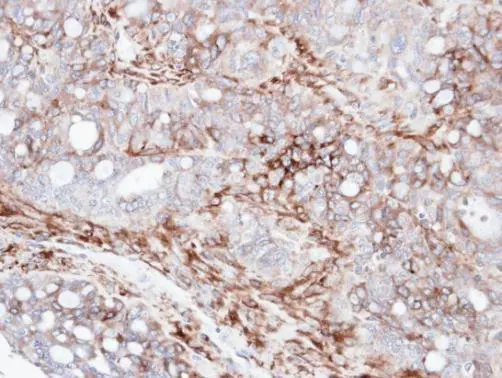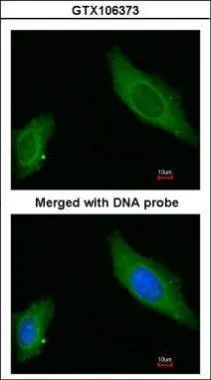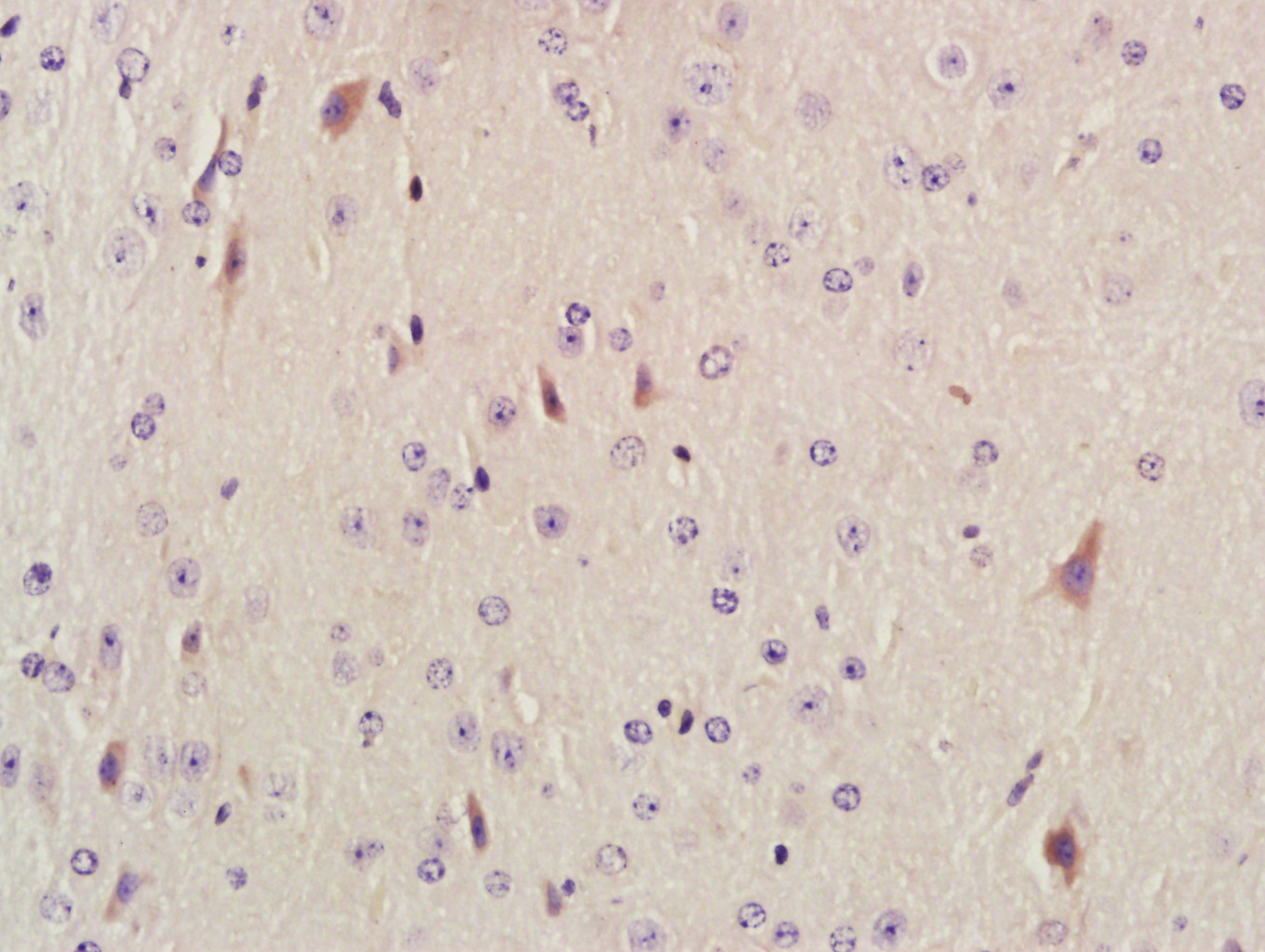
Immunohistochemical analysis of paraffin-embedded human serous ovarian cancer, using AKAP12(GTX106373) antibody at 1:100 dilution.
Antigen Retrieval: Trilogy? (EDTA based, pH 8.0) buffer, 15min
AKAP12 antibody [C3], C-term
GTX106373
ApplicationsImmunoFluorescence, Western Blot, ImmunoCytoChemistry, ImmunoHistoChemistry, ImmunoHistoChemistry Paraffin
Product group Antibodies
ReactivityHuman
TargetAKAP12
Overview
- SupplierGeneTex
- Product NameAKAP12 antibody [C3], C-term
- Delivery Days Customer9
- Application Supplier NoteWB: 1:500-1:3000. ICC/IF: 1:100-1:1000. IHC-P: 1:100-1:1000. *Optimal dilutions/concentrations should be determined by the researcher.Not tested in other applications.
- ApplicationsImmunoFluorescence, Western Blot, ImmunoCytoChemistry, ImmunoHistoChemistry, ImmunoHistoChemistry Paraffin
- CertificationResearch Use Only
- ClonalityPolyclonal
- Concentration0.21 mg/ml
- ConjugateUnconjugated
- Gene ID9590
- Target nameAKAP12
- Target descriptionA-kinase anchoring protein 12
- Target synonymsAKAP250, SSeCKS, A-kinase anchor protein 12, A kinase (PRKA) anchor protein 12, A-kinase anchor protein, 250kDa, Src-Suppressed C Kinase Substrate, kinase scaffold protein gravin, myasthenia gravis autoantigen gravin
- HostRabbit
- IsotypeIgG
- Protein IDQ02952
- Protein NameA-kinase anchor protein 12
- Scientific DescriptionThe A-kinase anchor proteins (AKAPs) are a group of structurally diverse proteins, which have the common function of binding to the regulatory subunit of protein kinase A (PKA) and confining the holoenzyme to discrete locations within the cell. This gene encodes a member of the AKAP family. The encoded protein is expressed in endothelial cells, cultured fibroblasts, and osteosarcoma cells. It associates with protein kinases A and C and phosphatase, and serves as a scaffold protein in signal transduction. This protein and RII PKA colocalize at the cell periphery. This protein is a cell growth-related protein. Antibodies to this protein can be produced by patients with myasthenia gravis. Alternative splicing of this gene results in two transcript variants encoding different isoforms. [provided by RefSeq]
- ReactivityHuman
- Storage Instruction-20°C or -80°C,2°C to 8°C
- UNSPSC41116161


![Boiled and unboiled whole cell extract (30 μg) were separated by 5% SDS-PAGE, and the membrane was blotted with AKAP12 antibody [C3], C-term (GTX106373) diluted at 1:1000. The HRP-conjugated anti-rabbit IgG antibody (GTX213110-01) was used to detect the primary antibody, and the signal was developed with Trident femto Western HRP Substrate. Boiled and unboiled whole cell extract (30 μg) were separated by 5% SDS-PAGE, and the membrane was blotted with AKAP12 antibody [C3], C-term (GTX106373) diluted at 1:1000. The HRP-conjugated anti-rabbit IgG antibody (GTX213110-01) was used to detect the primary antibody, and the signal was developed with Trident femto Western HRP Substrate.](https://www.genetex.com/upload/website/prouct_img/normal/GTX106373/GTX106373_45392_20240503_WB_24052202_973.webp)
![Various whole cell extracts (30 μg) were separated by 5% SDS-PAGE, and the membrane was blotted with AKAP12 antibody [C3] (GTX106373) diluted at 1:1000. The HRP-conjugated anti-rabbit IgG antibody (GTX213110-01) was used to detect the primary antibody. Various whole cell extracts (30 μg) were separated by 5% SDS-PAGE, and the membrane was blotted with AKAP12 antibody [C3] (GTX106373) diluted at 1:1000. The HRP-conjugated anti-rabbit IgG antibody (GTX213110-01) was used to detect the primary antibody.](https://www.genetex.com/upload/website/prouct_img/normal/GTX106373/GTX106373_45392_20241101_WB_TPM_watermark_24110700_833.webp)




![Various whole cell extracts (30 μg) were separated by 5% SDS-PAGE, and the membrane was blotted with AKAP12 antibody [HL3364] (GTX641184) diluted at 1:1000. The HRP-conjugated anti-rabbit IgG antibody (GTX213110-01) was used to detect the primary antibody. Corresponding RNA expression data for the same cell lines are based on Human Protein Atlas program.](https://www.genetex.com/upload/website/prouct_img/normal/GTX641184/GTX641184_T-45572_20241025_WB_TPM_watermark_24103022_166.webp)